Iran Says Talks With Saudi Arabia Are 'Cordial, Important And Positive'
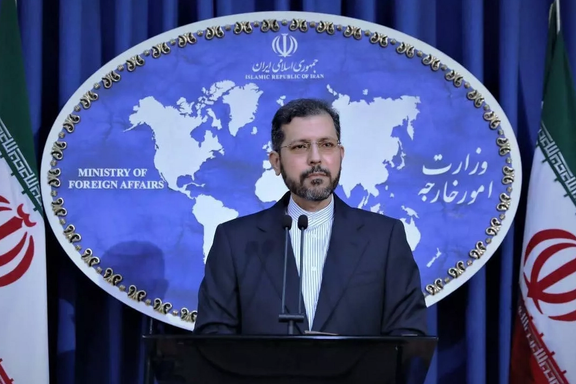
Iran’s foreign ministry spokesman, Saeed Khatibzadeh has said on Monday that talks with Saudi Arabia “have been cordial and to the same degree serious”.

Iran’s foreign ministry spokesman, Saeed Khatibzadeh has said on Monday that talks with Saudi Arabia “have been cordial and to the same degree serious”.
Khatibazadeh who was speaking to reporters during his weekly briefing, said that so far four rounds of negotiations have been held in Iraq and “talks have taken place in a friendly and positive atmosphere.”
Saudi Arabia and Iran severed diplomatic ties in January 2016 when mobs attacked and ransacked the Saudi embassy in Tehran and its consulate in Mashhad.
Riyadh later supported former US president Donald Trump’s decision to withdraw from the 2015 nuclear deal (JCPOA) and impose tough sanctions on Tehran.
Khatibzadeh did not offer any details to reporters but said that talks should be allowed to proceed at the negotiating table. He denied reports that a Saudi delegation might soon visit Iran.
Iran has so far presented a more optimistic picture of the talks while Saudi Arabia has said they have been “exploratory”.
The United States and its European allies who have been holding talks with Iran over its nuclear program have also raised the issue of Iran’s interventionist policies in the region. Iran might be interested to present its talks with Saudi Arabia as a counterweight to their arguments.
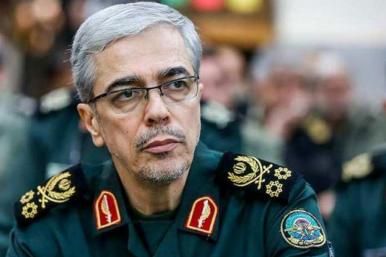
In a visit to Moscow on Monday, the head of Iran’s Armed Forces Joint Staff Mohammad Bagheri said that Afghanistan is a special issue for bilateral discussions.
General Bagheri said that Iran has always had cooperation with Russian armed forces, and in recent years the cooperation has expanded.
“I have been invited by the Russian defense minister and in addition to bilateral military issues that need follow-up, Afghanistan is among special issues that both sides will discuss,” Bagheri maintained.
He added, “Events in Afghanistan definitely have impact on regional counties, including the Islamic Republic, the Russian Federation and others and we will talk about these.”
Iran and Russia are military allies in Syria since 2015, when Russia deployed its air force in the war-torn country to defend the rule of Bashar al-Assad. With ground forces Iran supplied and with Russian air power, the anti-Assad armed opposition was largely defeated.
Bagheri also spoke about defense cooperation with Russia since the lifting of a United Nations arms embargo on Iran last October and said Iran has plans of weapons purchases from Russia. He also stressed the need to continue cooperation in Syria.
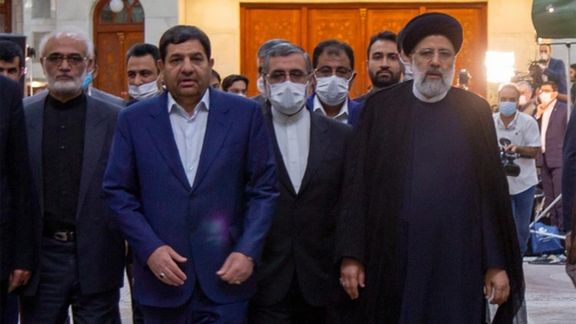
More than two months after his inauguration as Iran's new hardline President, Ebrahim Raisi (Raeesi) has completed the setup of his key economic team.
He appointed Ali Salehabadi as the Governor of the Central Bank of Iran, Majid Eshghi as the Chairman of the Stock Exchange and Davoud Manzour as the Taxation Department Chief in mid-October.
The official news agency said in an October 15 report that the make-up is not yet complete as there are still some vacant positions in the team, although these are not key positions.
Most of Raisi’s economic officials are either former military background or are functionaries of various types, none with high state-level or private sector economic experience.
Mohammad Mokhber, a key member of Supreme Leader Ali Khamenei's financial trust is First Vice President. His main job is to coordinate matters among various cabinet ministers. MassoudMirkazemi, an aide to former President Mahmoud Ahmadinejad, is the head of the Planning and Budget Organization. Farhad Rahbar, a former economic official at the Intelligence Ministry is Raisi’s assistant for economic affairs, and former IRGC commander Mohsen Rezaei is Vice President for Economic Affairs.
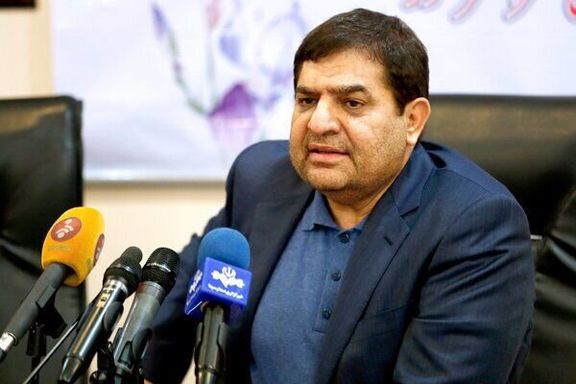
Rezaei recently issued a long directive to all economic officials and cabinet ministers which turned out to be nothing more than suggesting selling oil for food and other staples as a way of circumventing US sanctions, which could work only if Iran's possible trade partners risk being subjected to secondary sanctions.
Apart from Rezaei who has never been holding a position even remotely linked to economic affairs, the other members of President Raisi's economic team come mainly from Khamenei's office and his financial trust or from the administration of the holy shrine in Mashhad, where they worked with Raisi when he was the superintendent for about two years. Otherwise, none has had any executive experience in the government where they have to be more or less accountable for their performance.
Raisi’s officials are not used to checks and balances and the relative transparency of the government operations in comparison to non-accountable financial institutions that work parallel and sometimes totally separate from the government, do not pay taxes, and their operations are not scrutinized by the parliament and the State Auditing Organization.
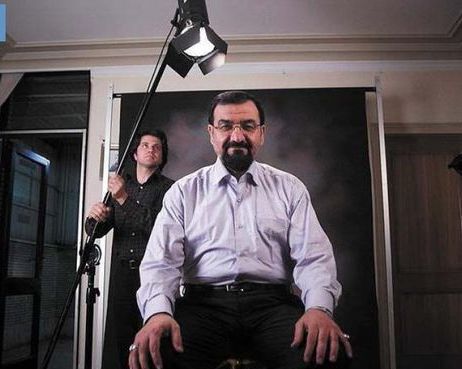
These characteristics are also shared by Raisi's eight economic cabinet ministers, including Industries, Mining and Trade Minister Reza Fatemi Amin whose biggest job previously was the investment manager of the holy shrine's administration.
The highlight in the career of Labor Minister Hojjatollah Abdolmaleki is working at the Office of the Imam Khomeini Relief Committee, a pseudo-charity that operates under the aegis of Khamenei's office and runs various businesses that do not have anything to do with relief work or Khomeini.
Oil Minister Javad Owji's former job as deputy oil minister is not the only activity he is known for. The stories in the press in the 2010s alleged that he was trading oil for gold to help circumvent the sanctions. Road and Urban Planning Rostam Ghasemi was also involved and at one point was called to court for investigations regarding illicit oil trade under Ahmadinejad. On the other hand, Ahmadinejad's Industry and Trade Minister Ali Akbar Mehrabian who was found guilty of piracy and violating an innovator's patent rights is now Raisi's Energy Minister.
Very little is known in the public domain about the track record of Communication and ITC Minister Isa Zarepour and Agriculture Minister Javad Sadatinejad.
Ehsan Khandouzi, who is the Minister of Economy, has very little chance to do any serious work under the conflicting influences of Mokhber and Rezaei. Khandouzi and Mirkazemi are the two key officials who need to tackle the long-standing problems of high inflation, low employment and a more than 50 percent budget deficit, not to mention the problem of a battered currency.
In the meantime, Mirkazemi is also tasked with correcting the country's budgeting system which means depriving powerful religious institutions of hefty budgets they get for doing nothing for the economy. Doing so will turn some of Raisi's supporters into critics.
The Keyword for any success for Raisi's economic team is "coordination". A task difficult to accomplish partly because of the differences among Raisi's top officials and partly because of sudden ad-hoc orders issued by Raisi himself, without consulting anyone when he faces serious issues.
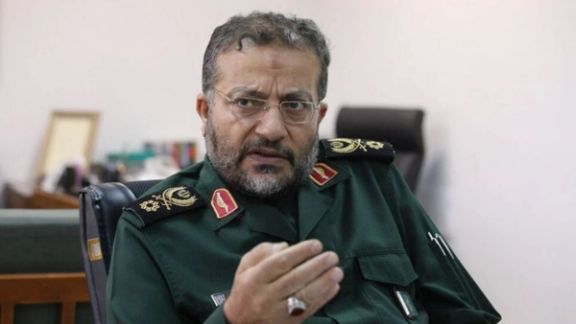
Iran’s Revolutionary Guards will take a share of an ambitious housing construction project promised by the government, that could cost billions of dollars.
General Gholamreza Soleimani, the commander of the Basij, a paramilitary wing of the Islamic Revolution Guard Corps (IRGC) said Sunday that his organization will construct 100,000 residential units. President Ebrahim Raisi (Raeesi) has promised to build one million units a year during his four-year term, a huge project that would need billions of dollars a year, although the government has not presented a budget or a clear plan.
Soleimani did not mention how much the Basij would charge the government for the project. The IRGC is the largest economic force in the country, having dozens of companies in all sectors. Its business involvement has been a controversial issue among Iranians.
Iran’s government faces a deficit equal to 35-50 percent of its overall budget, as US sanctions have cut off most of its oil export revenues. It also has to cope with a falling currency and near 50 percent annual inflation.
A previous housing project during the presidency of Mahmoud Ahmadinejad was never completed although it was carried out during high oil prices and up to $100 annual oil exports.

An Iranian lawmaker and an industry official say that Chinese vessels have been avoiding Iranian ports and Iranian ships are not allowed into Chinese ports.
At the same time, parliament’s research center has demanded that before signing any agreement with China, to clarify Beijing’s position regarding Western sanctions.
Iran has been promoting close relations with China as a counterweight to the United States, amid crippling sanctions imposed by Washington since 2018. Tehran has reached agreement over a 25-year strategic pact with Beijing, saying that China is ready to invest hundreds of billion of dollars in Iran.
But Massoud Daneshmand, member of the association of transportation companies told Iranian Labour News Agency (ILNA) that because of US sanctions against Iranian ports not even Chinese vessels do not use the facilities, unloading their cargo in Dubai from where the goods are transported by Iranian ships.
Hours after Daneshmand’s remarks, Mahmoud Abbaszadeh Meshkini, spokesman of parliament’s national security committee told Entekhab website that this is “not a new issue”. He added, “We have our own ways to circumvent the sanctions.”
It is not clear why Iranian officials had not complained before about the Chinese policy of complying with US sanctions and are raising the issue now.
China has generally respected sanctions against Iran, except reports of limited clandestine and indirect oil purchases which go unreported by its customs office.
Earlier in the week, Mohammad Reza Khiabani, the head of Iran’s commercial fleet had said that Iranian vessels have been banned from Chinese ports since last year. Another official has said that China admits Iranian vessels only in its small ports and demands huge fees.
The news about China’s enforcement of US sanctions on Iranian shipping might be embarrassing for hardline supporters of Supreme Leader Ali Khamenei who have been trumpeting Iran’s “Looking East” policy. Khamenei promulgated the policy in 2018, saying that Iran should adopt an Eastern orientation of relying on China and Russia for business and commerce in the face of US sanctions.
Washington has been reportedly leaning on Beijing in recent months to curtail its dealings with Tehran, to pressure it to reach agreement in nuclear talks that started in April. Iran stopped the talks in June and so far, has refused to return to the negotiating table, while enriching more uranium.
In another development, India in September seized three tons of heroin worth $2.72 billion in September and its largest port operator later announced that it would not handle any cargo originating in Iran, Pakistan or Afghanistan.
An Iranian news website reported in 2018 that Dubai's main port handles five times more cargo than all of Iran 20 ports.
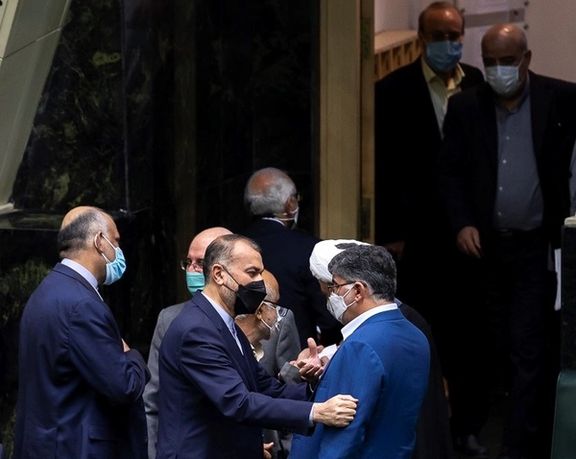
Iran's foreign minister has told a closed-door parliamentary session that Tehran expects US "goodwill" and actions before it returns to nuclear talks.
Lawmakers speaking to media after Sunday's session said Hossein Amir-Abdollahian reiterated that Iran needs to see "serious steps" by Washington before it resumes talks suspended since June.
Alireza Salimi, a leading lawmaker quoted Amir-Abdollahian as saying that Iran's policy is "action for action". Earlier this month, the foreign minister had alluded to demands that Washington should unfreeze some of Iran's blocked funds before Tehran engages in contacts with the US.
Speaking to Tasnim news agency on Sunday, Shahriar Heydari, a member of the parliament's National Security and Foreign Policy Committee, said the foreign minister also thanked Parliament for ratifying a nuclear bill in December aimed at toughening Iran's bargaining position and said this will give the other parties a clear message and enhance the power of Iran’s negotiators.
The parliament passed an act entitled "Strategic Action Plan to Counter Sanctions and Protect Rights of the People Act" in December that obliged the government to step up Iran’s nuclear program further beyond the limits set by the 2015 nuclear agreement with world powers and to reduce Iran’s cooperation with the United Nations nuclear watchdog, the International Atomic Energy Agency (IAEA).
“By the Iranian foreign minister’s own admission, the 'Strategic Action Plan' has drawn the attention of influential countries,” another lawmaker, Behruz Mohebbi, tweeted after the meeting. He added that all parties to the agreement have received "a clear and serious message" and that the government" will have a "strong tool" in its hands in the upcoming talks.
Europeans have recently raised pressure on Tehran to resume the talks. On June 20, two days after the election of Ebrahim Raisi (Raeesi) to presidency, Iran suspended the talks that began in Vienna in April and has delayed its return despite repeated promises of resuming the negotiations “soon”.
Alluding to Iran's accelerating enrichment of uranium to higher fissile purity, a possible pathway to a nuclear bomb, diplomats from Britain, Germany and France, known as the E3, said in a note on Wednesday that the situation with Iran’s nuclear activities has been worsening since negotiations stalled in June.
During a visit by Enrique Mora, European Union’s lead negotiator on Iran’s nuclear issue Thursday, Iran agreed to meet with E3 representatives in Brussels in the coming weeks. According to lawmakers, in Sunday's closed session Amir-Abdollahian said talks with E3, Russia and China, the five remaining parties to the JCPOA, will begin in Brussels on Thursday [21 October]. This in effect would be circumventing the United States if no US representative travels to Brussels to be on the sidelines of the talks, as was the case in Vienna.
After the parliament's meeting with Amir-Abdollahian Sunday, lawmaker Alireza Salimi also quoted Amir-Abdollahian as saying that the Vienna talks must begin "from the point where Trump withdrew from the JCPOA". Former US President Donald Trump withdrew from the deal in 2018 and imposed tough sanctions on Iran.
According to lawmakers Amir-Abdollahian also tried to assure parliament that Iran will not be pressured by the economic hardship prevailing in the country and will seek alternatives to help people in their daily lives. This would be no easy proposition as US sanctions have deprived Tehran of tens of billions of dollars in oil export revenues.
A report by the Plan and Budget Organization prepared in August, before Hassan Rouhani handed the administration to Ebrahim Raisi, was published Saturday that paints a very grim picture of the Iranian economy if talks fail and US sanctions are not lifted.
According to the report, if sanctions continue, in 2024 the government will face bankruptcy and the national currency will lose value tenfold. The dollar may rise to as high as 2,840,000 rials in 2027. Currently the dollar is trading at 270,000 rials.